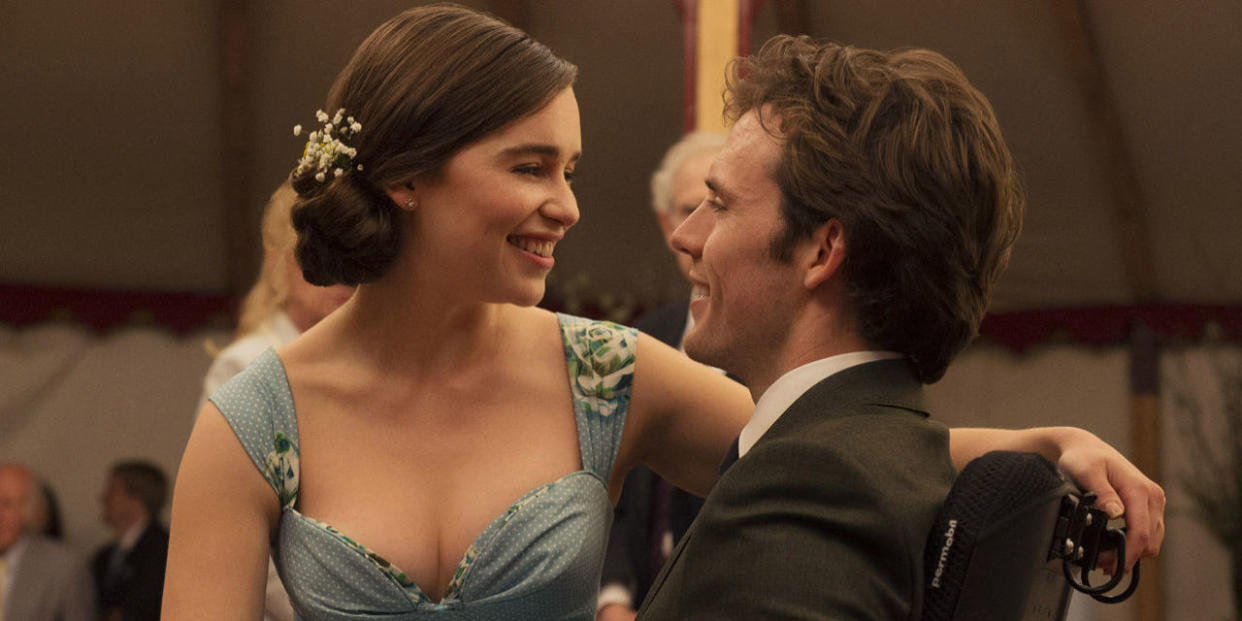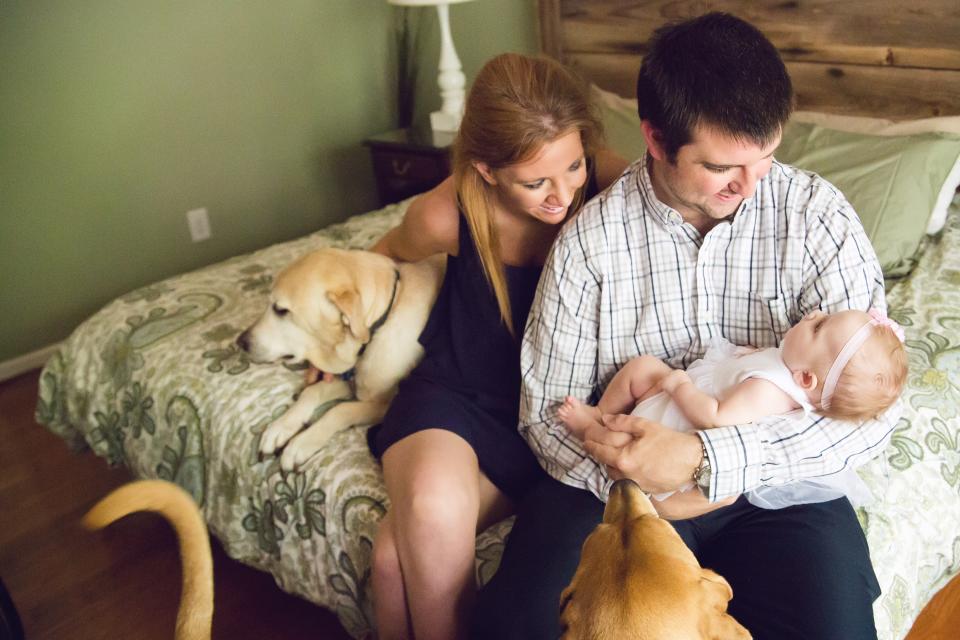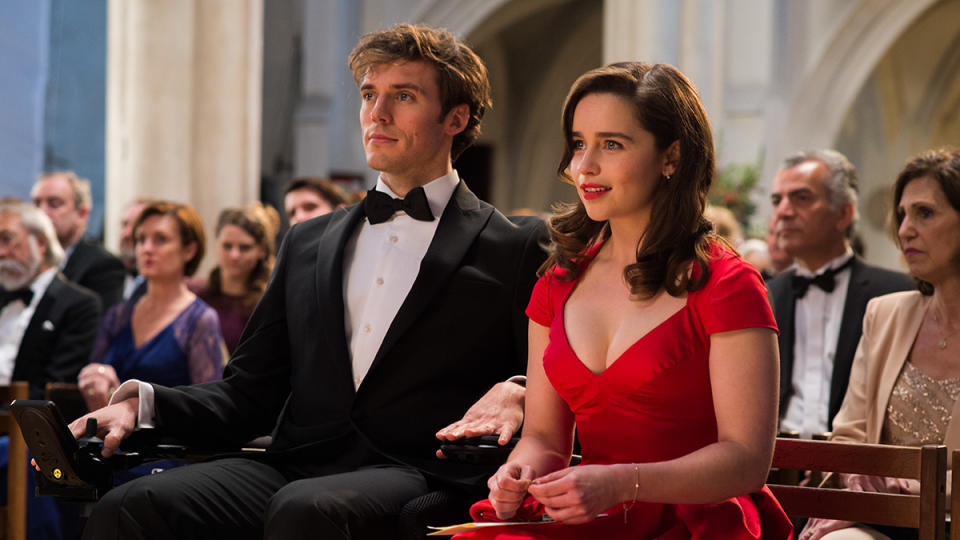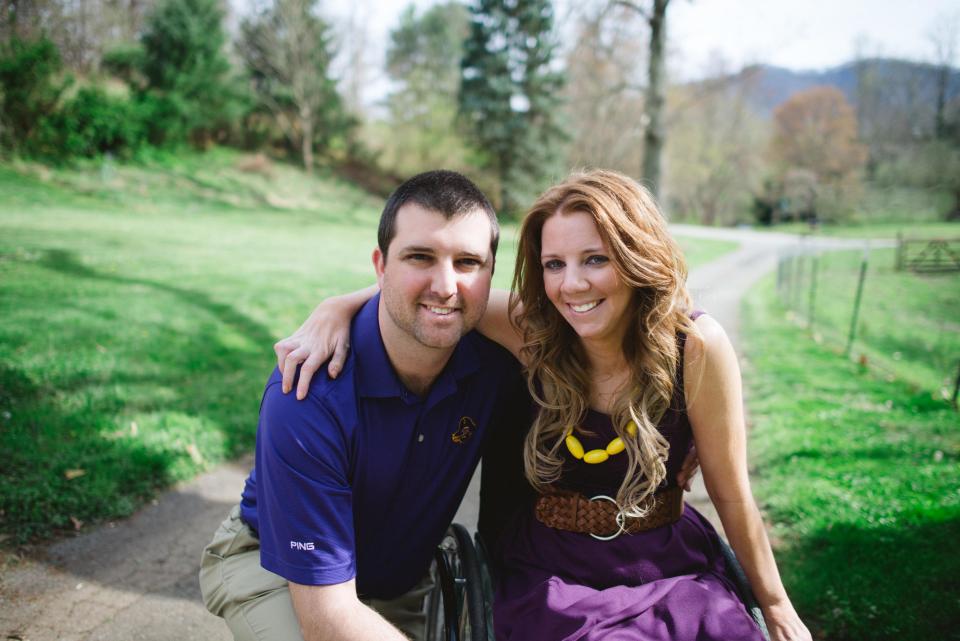Why I Don't Think "Me Before You" Is Offensive as a Quadriplegic Woman

Me Before You is a romance and a tearjerker - and it's also one of the most controversial movies of the summer for its portrayal of disabled people. Based on a best-selling novel by Jojo Moyes, the movie follows Will, a once adventure-seeking young man turned angry quadriplegic, and his jovial new caretaker, Louisa. They fall in love, but at the end of the movie [spoiler alert], Will commits assisted suicide, as he'd been planning to do before he ever meeting Louisa. The backlash to the movie is twofold: For starters, Will is played by an able-bodied actor (Sam Claflin) rather than an actual quadriplegic. And then there's the fact that he chooses to die, which many people say sends the wrong message about the value of a disabled person's life.
Cosmopolitan.com spoke to Rachelle Friedman, a 30-year-old quadriplegic woman (and one-time Cosmo contributor). Like Will, Rachelle lead an active life until a freak accident in 2010. Just four weeks before her wedding to her college sweetheart, she broke her neck at her bachelorette party, when her friend playfully pushed her into a pool and Rachelle landed headfirst in the water. The accident left her with no finger function and very limited use of her triceps. A year later, she married her fiancé, Chris Chapman, and in 2014, she wrote a book about her road to marriage, The Promise: A Tragic Accident, a Paralyzed Bride, and the Power of Love, Loyalty, and Friendship, dispelling myths about the love lives of disabled people, among other things.
Here, Rachelle, who now works as a public speaker, entrepreneur, and is mom to one-year-old Kaylee Rae (whom she had with help from a surrogate), gives her review of Me Before You and its backlash:

"My main concern before seeing the movie was that Will was going to kill himself at the end of it to lift a 'burden' from his family and his girlfriend Louisa - which would have bothered me because disabled people are not a burden - but it turned out that his decision had nothing to do with them, it was for him. And while I disagree with his choice, I understand why he felt the way he felt, and I ultimately think people have the right to choose assisted suicide (I'm sure I'll get a lot of flack for saying that, but I don't think it's wrong). What people need to realize is that Will was in tremendous pain. There was one line in the movie that may have gone in one ear and out the other for some people, but it really resonated with me - the nurse mentioned to Louisa how sometimes Will would be awake screaming at night because he was in so much agony.
Nerve pain is something that I also experience, which a lot of people don't realize. Just because I'm paralyzed doesn't mean that my body doesn't feel anything. Sometimes, my whole body feels like it's on fire, like pins and needles, bee stings; it's as if your foot were painfully asleep but it's your entire body. That can cause some serious depression. Some of the people who are in chairs who have an opinion about Will's experience don't feel nerve pain at all and I don't think they fully understand his experience. I wish the movie showed his suffering. It touched on it, but I think had it shown more, those scenes would have been imprinted on people's brains and maybe they would have felt differently about the ending.
Sometimes, my whole body feels like it's on fire, like pins and needles, bee stings; it's as if your foot were painfully asleep but it's your entire body.
That said, there are many people with severe pain who have a great will to live. I'm one of them, even if my pain's not as severe as Will's. People are so surprised that after my injury, I was able to still be in love. As mushy as it sounds, my husband Chris and I literally have that movie romance - we talk to each other that way and feel each other that way, and we look into each other's eyes like we are part of each other, and it's nothing that a wheelchair could ever change. I felt like that was happening in the movie: Will could have had this love that I have and he chose not to. He chose assisted suicide. Perhaps that's because when you feel that much pain, it will cause you depression, it will cause you not to be focused on anything. You could be having the time of your life, but if you're in pain, you can't enjoy it.
Do I feel like that should be the only depiction of quadriplegics or disabled people we see in pop culture? Absolutely not, but we have true inspirational stories in the media of people overcoming the odds and living great lives - and my story is one of them. I wrote the book The Promise, and that shows what someone with a disability can overcome while still being honest about how hard it is. There was also a documentary called Murder Ball, which was really popular, about the U.S. Wheelchair Rugby Team, and the players are all independent, playing a hardcore sport. Of course it would be nice if Hollywood could tell more fictional stories that had a happy ending too.
The other controversy surrounding the movie is whether Will should have been played by a quadriplegic rather than an able-bodied actor. I lean toward the opinion of using a disabled actor when possible, but I will say, I recently filmed a reality special that will air on TLC this year. The crew came a few days at a time about five times over the period of a year. I can't explain to you how exhausted I was after every day of filming. Think about all of the time it takes for someone who is a quadriplegic to change outfits, the amount of time it takes us to go to the bathroom, the possible low blood pressure issues that could jeopardize a whole day of filming because you can't sit up without passing out. You might suggest they use someone with a lower-level injury like a paraplegic, but to me, that is just as fake as an able-bodied person playing somebody with a high-level injury. Paraplegics don't know much more than able-bodied people about the life of a high-level quadriplegic.

Casting aside, I found the movie accurate in terms of what a quadriplegic goes through. There was a part in the movie where the nurse is explaining to Louisa all the medicines, and that is literally my medicine cabinet: I take medicine for nerve pain, they mentioned that, I take medicine for spasms, they mentioned that, I take a medicine to keep my blood pressure up when I get up in the morning. Also, they talk about something called 'autonomic dysreflexia' and I am sure everyone in the movie theater was like, 'What the heck is that?' Autonomic dysreflexia is something quads go through when there is something wrong, such as an infection, and our body gets a signal that something is wrong and our blood pressure skyrockets. It makes us really sweaty, like what happened to Will in the movie a couple of times. That is a huge thing for them to mention - so educational and accurate.
That said, the movie didn't explore the financial realities many people in this situation face. When you get an injury, you lose your job and if you want to be active and live your life, you have got to have thousands of dollars. Will didn't have to worry about those things. He could fly to the tropical beach on a private jet and that's just not real life. I miss being able to play tennis, which I played for 20 years, and now if I want to play tennis again, I have to buy a $3,000 tennis chair that I can't afford. Also, the wheelchair he was in made no sense at all. If you are paralyzed from the neck down, to the point where he could not turn his head, you're going to need a headrest. Even me, I have a hard time balancing because I don't have any core muscles - so for someone who has no function at all, from the head down, they're going to need a seat belt, side guards, a higher back, and a head rest. Also, a lot of people, especially with injuries that high, are on ventilators. It would be really, really rare for him to not have some sort of scar on his neck.
When you get an injury, you lose your job and if you want to be active and live your life, you have got to have thousands of dollars.
One other thing missing: I think they should have had Louisa and him have sex or show something to more clearly imply that it happens. Quadriplegics are not asexual, we can still have sex. I did a lingerie photo shoot, because I wanted to literally sexualize myself. Some people on Facebook were mad that I was doing that, but it wasn't for my own attention-getting, it was to prove a point that we are not scary underneath it all. I already have a husband, but I want this message out there for all of those girls and guys sitting in chairs who aren't getting hit on because, even though someone may think that they are really hot and really fun, they also assume they aren't sexual beings. Let's be honest: Sex isn't everything, but sex is a part of a relationship, and if someone thinks that you can't do it, then they won't pursue it.

I did like, however, that this movie showed people that someone can fall in love with someone in a wheelchair. If I were single, it would give me hope that someone could fall in love with me. That's a very real fear for someone who has been injured: 'Who is going to love me?' But, really, there are a lot of people out there who will accept you for who you are. My husband does, completely. A lot of people said that I was selfish for not letting him go, that he could have had a better life without me. They didn't think that because they are terrible, they thought that because they don't understand the life that we have. Sam Claflin did an interview where he called his character's decision a 'selfless act.' The disability community was understandably outraged by that statement. I don't even think he understood his own character's thinking. Honestly, if I ever left Chris, he'd be devastated. I would be way more of a burden on my family and my husband if I left. And I wouldn't care if Chris were just a head, I would not be able to go on without him.
I'm often called 'inspiring' and sometimes I believe it's just because I'm living my life, when that's what 99 percent of people who get a spinal cord injury do. Yes, a large number of people with spinal cord injuries consider suicide, but once we figure out how life is going to be, that often goes away. It's human nature to want to survive and often it's because you want to be around for the people you love. If I were to give any advice to anyone who has a spinal cord injury, it's 'give your life a chance, because you never know what you'll be capable of doing with what you have.'"
Follow Darla on Twitter.

